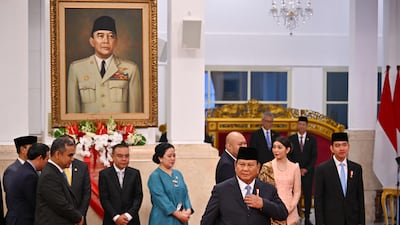The US presidential election is understandably commanding enormous attention, but this week marks a significant new chapter in the world’s third-largest democracy and fourth-most populous country, Indonesia, where the presidency of Prabowo Subianto was inaugurated on Sunday. We may soon be hearing rather more of his country.
Mr Prabowo will probably sit comfortably in office. A former special forces general during the 30-year-rule of his then father-in-law, Suharto, Mr Prabowo stood for the vice presidency once and the presidency twice before winning election in January this year. He served as defence minister since 2019 as part of the cabinet of his erstwhile opponent, Joko Widodo, who was considered to have implicitly endorsed his successor during the presidential contest, not least because Mr Joko’s elder son was Mr Prabowo’s running mate.
When I saw him being interviewed on stage in Doha in May, Mr Prabowo already had the air and confidence of a seasoned leader. And it was apt that it should have been in an international setting, for as his new Minister of Cultural Affairs, Fadli Zon, says: “Prabowo will be a foreign policy president and have a hands-on approach in dealing with foreign policy matters.”
Mr Prabowo’s predecessor-but-one, Susilo Bangbang Yudhoyono, made a similar prediction in June, posting on X in Indonesian: “Pak Prabowo, ‘you are on the right track’ and have become a ‘foreign policy president’. Good luck and carry on!” He praised Mr Prabowo’s speech at the Shangri-La Dialogue, Asia’s pre-eminent security conference, as “strong and also beautiful”.
Mr Joko never attended the UN General Assembly, and mostly left diplomacy to his foreign minister, Retno Marsudi. By contrast, Mr Prabowo has visited more than 20 countries since being elected this year, meeting leaders including President Sheikh Mohamed, China’s Xi Jinping, Russia’s Vladimir Putin, France’s Emmanuel Macron and the heads of five governments within the Association of South-East Asian Nations.
It’s natural that Mr Prabowo feels at ease abroad: for most of his childhood, his family were living overseas, and he speaks French, German, English and Dutch. But wearing the mantle of an international statesman also appears to be second nature to him.
In June last year, he surprised his own government when he put forward a four-point proposal to end the war in Ukraine. He did so, he explained in an interview in January, because “the Global South is suffering disproportionately from the effects of this war even though it has nothing to do with it, and can in no way change what is happening”.
Indonesia, he said, needed “to play a more assertive role in shaping geopolitical events”. Pointing out that his country had been one of the founders of the Non-Aligned Movement in 1961, Mr Prabowo said “advocating in favour of the Global South and developing nations, advocating for a world system that does not favour the developed North at the expense of the Global South, is in the DNA of our foreign policy”.
That may well be true. The change is that with Mr Prabowo, Indonesia may not have had a leader who is so ready to take a place on the world stage since its founding president, Sukarno. Earlier this year, he said: “It is only natural that as Indonesia develops, as it grows, it must assume the new responsibilities that come with its position as an emerging power.”
This, I would argue, is something that should be welcomed. Indonesia has a population of nearly 300 million people, it is the world’s largest Muslim state, it is already the world’s eighth-largest economy in terms of purchasing power parity, and many consider it to be on the cusp of a remarkable economic transformation. It’s a plural, vibrant, multi-ethnic society, with a wealth of culture and a long tradition of moderation.
Maybe it is time for Indonesia to take a more prominent role in international affairs. If so, cometh the hour, cometh the man?
I would say so. For Mr Prabowo’s plan for Ukraine dealt with the reality of what appears to be a terrible, intractable stalemate. He is firm about the need for the Israeli occupation of Palestinian lands to end. He is equally firm that Indonesia wants to continue to have “excellent relations” and maintain “important partnerships” with both China and the US.

“What I will not do as president is align Indonesia to one or the other. Indonesia is too big to be aligned to any other country. Indonesia can only be aligned to Indonesia’s best interest,” he said. There are many countries that would like to do and say exactly the same. They will be pleased if Indonesia, as a more assertive middle power under Mr Prabowo, provides them with a lead to follow.
There will be plenty of challenges at home, not least fulfilling Mr Prabowo’s aim of reaching annual growth of 8 per cent. But the self-styled “continuity” candidate has reassured markets by retaining many of his predecessor’s ministers, most notably Sri Mulyani Indrawati, the country’s highly regarded finance minister.
And in reference to the allegations of human rights abuses relating to his time in the military – which organisations such as the BBC never stop claiming “have dogged him for decades” – Mr Prabowo has apologised to two former democracy activists from the late 1990s. He has also appointed one of them, Budiman Sujatmiko, to a key role as head of the Poverty Alleviation Acceleration Agency.
“We have both moved to the middle,” said the one-time fiery radical, Mr Budiman. He also dismissed western sniping at Mr Prabowo. “Developed countries don’t like leaders from developing countries who are brave, firm and strategic.”
I remember meeting Mr Budiman, and the new culture minister, Mr Fadli, in Jakarta 15 years ago. Who would have thought then that their time would come together, with the elevation of Mr Prabowo – who many then considered to be a tempestuous former general – to the presidency?
Perhaps the new leader has been following the saying he is fond of quoting: “A thousand friends are too few, one enemy is too many.” If Mr Prabowo can manage to keep to that, both at home and abroad, many may be glad if the “sleeping giant” of South-East Asia is beginning to awaken.







